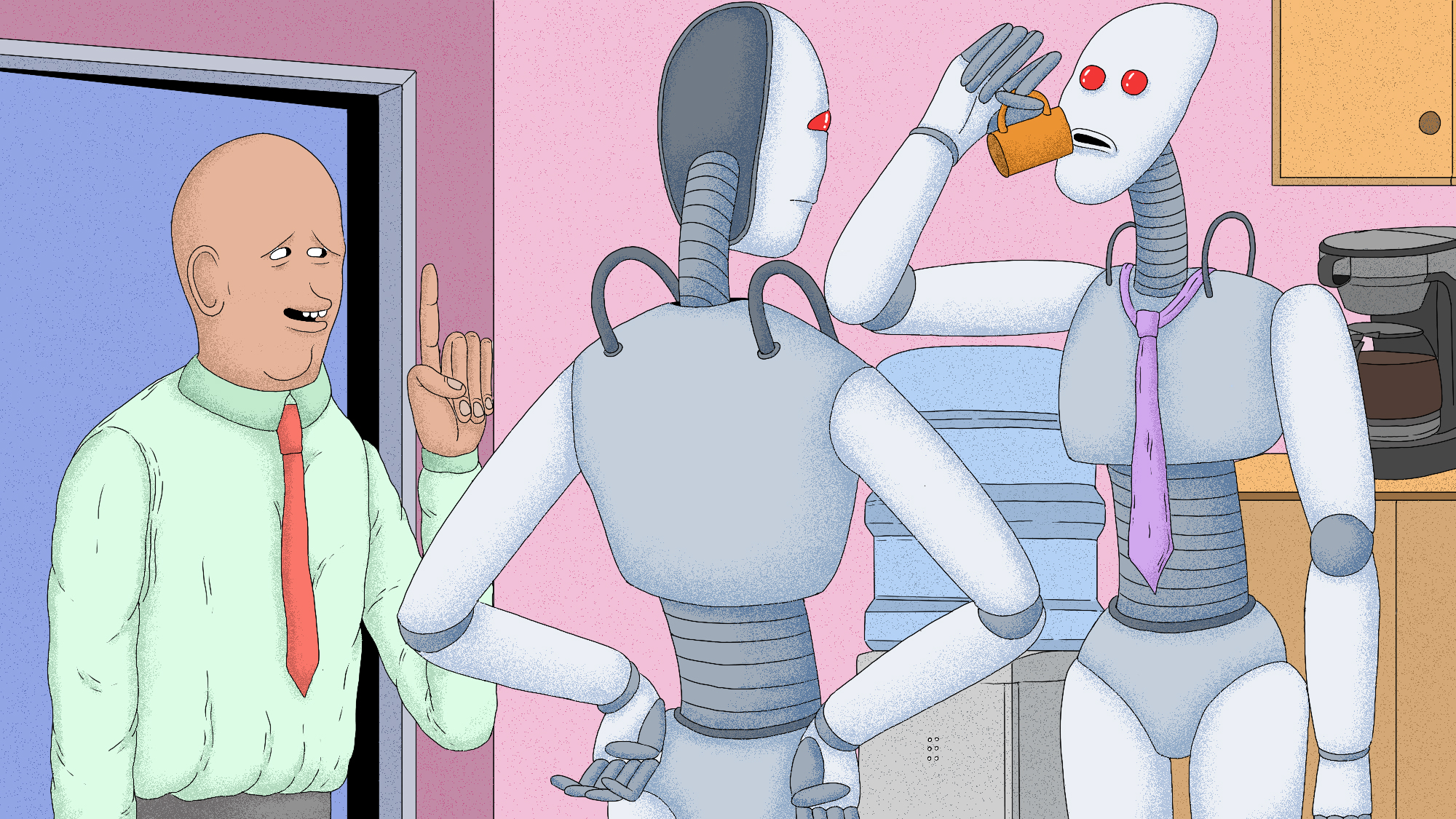
Experts believe that almost a third of the global workforce will be automated by 2030. But are universities preparing students for the rise of the office machines?
Had you popped into the equity trading floor at Goldman
Sachs' New York headquarters in 2000, you would have walked into a bloodbath of
the senses: 500 men and women projectile swearing, phones blaring, the dizzying
aroma of adrenaline oozing from every human orifice. These days, you might just
make out the lifeless whir of 200 high-speed servers over the ticking clock.
Because those 500 people have been whittled down to three. The
other 497 have been usurped by complex algorithms.
These were not working stiffs: cleaners, receptionists or
other service-industry hirelings already humbled by computers. They were
university graduates with hard-fought degrees in subjects like business,
finance or economics. Trouble was, for all their brainpower, passion and
pedigree, algorithms just did the job better. They aren't the only victims. The
computers, now, have caught the scent of blood.
"A lot of people assume automation is only going to
affect blue-collar people, and that so long as you go to university you will be
immune to that," says Martin Ford, author of Rise of the Robots:
Technology and the Threat of a Jobless Future. "But that's not true,
there will be a much broader impact."
This raises the question: as we move toward the brave new
automated world, is a university degree in, say, economics, philosophy, English
or anything else that isn't to do with fixing cobots (collaborative robots) or
writing algorithms worth the PDF file it was exported on? Or is it, practically
speaking, useless? And if so, what are universities doing about it?
"Most universities are simply not doing enough to
prepare students for the automated workforce," says Nancy W Gleason, PhD,
director of the Centre for Teaching and Learning at Singapore's Yale-NUS
College, and the author ofHigher Education: Preparation for the Fourth
Industrial Revolution. "We need to teach students to be cognitively
flexible, to have the skills and confidence to try different jobs throughout
their lives. In the gig economy, you're not going to have seven employers,
you're going to have seven careers. People might say, 'Oh my degree in history
didn't do me any good.' Well, guess what, neither will a degree in radiology,
dentistry or law."
This is not a joke. Last year, a report by
McKinsey Global Institute suggested that up to 800 million careers (or 30
percent of the global job force) – from doctors to accountants, lawyers to
journalists – will be lost to computers by 2030, while every single worker on
earth will need to adapt "as their occupations evolve alongside
increasingly capable machines". Others suggest this number may be as high
as 50 percent. "Machines are taking on cognitive capability, beginning to
compete with our ability to reason, to make decisions and, most importantly, to
learn," adds Ford. "At least over the next couple of decades, AI and
robotics are going to eliminate huge amounts of jobs. Beyond that, it gets more
unpredictable; we really don't know what's going to happen."
*
To find out more, I contacted 25 of the world's leading
universities to ask what, if anything, they are doing to prepare students for
the choppy waters of fluid work. Of America's eight Ivy League schools, only
Dartmouth College had something to say; the rest either did not reply, were too
busy or couldn't find the proper person for me to speak to. And of the eight UK
universities I approached, the London School of Economics and University of
Sheffield did not reply, while Leeds and Birmingham both couldn't find anyone
suitable to comment. A press officer for the University of Cambridge said she
wasn't "aware of anything Cambridge-specific".
Oxford, Bristol, Manchester and City, University of London,
however, all got back to me. "Next year, we'll be introducing an
interdisciplinary course unit that all of our undergraduates can take, and
which looks at exactly this issue," said Caroline Jay, PhD, a senior
lecturer in computer science at the University of Manchester.
According to its overview, the course, called AI: Robot Overlord,
Replacement or Colleague?, aims to "equip Manchester
graduates from all disciplines with an understanding of the impact this technology
currently has, the way this is likely to change in the future and, crucially,
the ability to grasp the opportunities it brings, whatever your chosen
career."

"The whole point of universities is to equip people
with the skills to learn," adds Jay. "Students are not just here to
learn a set of facts, but to learn how things change, evolve and how they can
fit into that future."
The University of Bristol takes a broader view. "If the
economy is becoming more of a gig economy, preparing students to become
entrepreneurial is something we take very seriously," says Dave Jarman of
the university's Centre for Innovation and Entrepreneurship.
So the university has built Bristol Futures, a new
initiative that offers a range of open online courses designed to provide
"the opportunity for the development of core academic skills and key
personal attributes to help students become adaptable, successful
graduates". The courses currently offered – Innovation and Enterprise,
Global Citizenship and Sustainable Futures – are not degrees per se, but run
alongside a student's chosen subject.
"This is our long game," says Jarman. "We're
looking at how we smuggle those ideas into anything from classics to chemistry.
Of course, sometimes changing practice in a university is like turning round an
oil tanker in a phone box, but we're in that process."
Dirk Erfurth, the careers service director at the University
of Munich (LMU), in Germany, agrees. "You cannot expect every professor in
every faculty to take these issues as their most serious concerns. That is not
their task. It is our task in the careers service, as the bridge between the
labour market and the academic world."
He says LMU offers funded overseas internships, mentoring
programmes and holiday-season mini-courses (€95 (£85) for 40 hours of class
time) in subjects like presentation and rhetoric, leadership, time management
and communication, and conflict management, as well as a "professional
education unit" for former students looking for a skills bump. Erfurth
says LMU takes students' future employability very seriously, as long as the
students are prepared to play the game.
"This is not about grades or certificates," he adds. "We want to show students that, if you invest a little bit of time and money in your skills, wonderful things can happen to you. You have to leave your comfort zone and go out into the world, to distinguish yourself from others, take internships, develop your open-mindedness, creative thinking, curiosity, networking and entrepreneurial spirit. Those are the skills that will make you employable in the future." This is what the University of Copenhagen calls an "interdisciplinary skills profile".
"This is not about grades or certificates," he adds. "We want to show students that, if you invest a little bit of time and money in your skills, wonderful things can happen to you. You have to leave your comfort zone and go out into the world, to distinguish yourself from others, take internships, develop your open-mindedness, creative thinking, curiosity, networking and entrepreneurial spirit. Those are the skills that will make you employable in the future." This is what the University of Copenhagen calls an "interdisciplinary skills profile".
"We aim to improve students' opportunities to exploit
the potential of digitalisation and big data both across the university and
with our collaborated partners," says the university's vice-provost, Anni
Søborg, echoing much of what I've already heard. "And we make explicit how
programmes can be applied in the job market, including a focus on initiatives
that ensure students have the requisite skills for innovation and
entrepreneurship."
And so, over to America, which Dr Gleason says is
"doing very little in higher education relative to other countries".
"The truth is, we don't actually know all the jobs we are preparing
students for," says Dartmouth's associate dean for the sciences, Dan
Rockmore. "Dartmouth is the premier liberal arts university in the world.
The liberal arts ethos is that a well-rounded and broad education, an exposure
to the multidimensional nature of the great challenges of our day, are what
prepares a mind for the unpredictable challenges of the world post-graduation.
We aim to teach critical thinking, habits of mind that can be brought to bear
in many different contexts."
He then pointed to the Dartmouth Entrepreneurial Network,
which gives students "the opportunity to try out ideas for and in the 'new
economy'", along with its "flexible quarter" system that gives
students the "opportunity to experience the workplaces of the new
economy" all year round. "In short, a Dartmouth education will
prepare students to take advantage of those [technological]
transformations."
The key point here is that all these courses are optional.
No students are forced to take them, and they offer no future-proofing
guarantees. But then, is it really a university's responsibility to hold
students' hands throughout their lives? Or is it, really, up to students?
"I would say this is like a gym membership, not a
butler," says Jarman. "You don't pay your money and the goods turn
up. You pay for an opportunity, but you've got to go in and lift the weights
and run the distance. If you do those things, universities have got amazing
facilities and people that can help you accelerate that process. But it doesn’t
land on a plate."
University students – as Jonathan Black, the director of
university career services at Oxford University, is keen to point out – are
adults after all. "One of the things Oxford, and other universities,
endeavour to do is to persuade people who are perfectly bright enough to
benefit from a university education to consider our many extracurricular
services, such as the careers department, student societies, volunteering or
work experience in the summer. That's where they're going to get that experience,
but they’ve got to realise they're getting it."
He went on: "But we're not going to tell students what
to do. I think we'd be doing students a disservice if we hold their hand all
the way until the end and then say, 'Here's your job.' We're here to lay the
table, show students what's available, but it's up to them to decide if they
want to eat."
The truth is, what keeps most university presidents up at
night is not the robocalypse, but shorter-term threats to their survival, like
competing for endowments and enrolment. But there is one university president
whose dreamsare overrun by robots. That, Joseph E Aoun says, is his
advantage: robots cannot dream. The president of Northeastern University (NU)
in Boston has developed a strategy to fight back. He calls it
"humanics".
"If robots are going to replace human beings in the
workplace, then we need to become robot-proof," he says. "The rise of
extraordinary artificial intelligence requires us to cultivate extraordinary
human intelligence. Even today's most brilliant machines still have
limitations. Machines do not yet have a capacity for creativity, innovation or
inspiration."
His idea, essentially, is to give students the ability to
solve the world's most urgent issues in a way that robots cannot – with empathy.
Or, as he puts it: "I've not yet seen a computer cry."

Laid out in his book, Robot-Proof: Higher Education
in the Age of Artificial Intelligence, humanics has become a staple of
Northeastern’s programme that requires computer science majors to, say, take
side classes in theatre or improvisation. "Why? Because it allows them to
start interacting with others, which is a simplistic but vital example of
getting people to go beyond what they’re studying," he says. "Human
interaction is going to be a vital skill in the future."
Aoun argues that the only way to create a curriculum for a
"robot-proof" education is by fostering "purposeful integration
of technical literacies, such as coding and data literacy, with human
literacies, such as creativity, ethics, cultural agility and
entrepreneurship".
But, he says, experiential learning is also essential, and
so has developed an acclaimed co-operative education and career-development
programme called Co-op at NU. "We have a network of 3,000 employers in 136
countries on all continents, including Antarctica, where the students apply for
paid jobs for six months," he says. "There, they get the unique
opportunity to learn how people interact in the workplace, what opportunities
look like, what it's like to work in a different cultural setting; they start
understanding themselves better. That is powerful and transformational."
The numbers speak for themselves: most students do two or
three co-ops throughout their college years, and 92 percent of them find
full-time work within nine months of graduating.
*
The flood of automation is coming. But Aoun and Gleason say
simply teaching students to swim – as the handful of universities I spoke to
are beginning to do – will not save them from drowning eventually. Instead,
they agree, we need to build an arc. "We must move away from the idea of a
university degree being front-loaded in the first 18 to 24 years of your
life," says Gleason. "Instead of a three- to four-year model,
students should be admitted for 20 years with the ability to come back and take
classes for free whenever they want."
That is exactly what both NU and NUS, where Gleason works,
are doing. NUS, for example, has launched two government-supported
"lifelong learning institutes", where graduates can return at any
stage of life to "upskill" in hundreds of courses – long and short –
from psychology to Arabic, "business agility" to "cyber security
for the internet of things". "We are looking at stacking courses
together to re-skill adults," Gleason says. "It's a long road ahead,
but the real low-lying fruit is more experiential learning, and less
lectures."
As for NU, Aoun has overseen the establishment of a
lifetime-learning network of campuses in Charlotte, North Carolina, Seattle,
Silicon Valley, Toronto and San Francisco, where members can return to learn
new skills. "Seventy-four percent of the population are what we call
'non-professional learners'," he says. "Ignore them and universities
will become irrelevant. If we don't step in and integrate lifelong learning as
part of our core mission, we become like the railway industry that saw the
onset of the airline revolution and said, 'This is nothing to do with us.' They
didn't see themselves in the transportation business, and their business
suffered as a result."
None of this, of course, comes cheap. NUS and NU are both
well-funded institutions. Gleason suggests a tax on robots would cover it. If
not, industry needs to step up and cough up. "I don't see why industry
shouldn't," she adds. "It's not like they won't be profiting from
some of the jobs that go away."
So what, in the meantime, can students who don't go to NUS
or NU – or one of the world's few other universities with similar ideas – do to
future-proof their careers? The answer, really, is to become as human as
humanly possible. We need to fight back with feelings. "The future labour
market needs not content experts or information processors," says Gleason,
"but creators, analysers, problem solvers, collaborators and lifelong
learners who are able to acquire new skills as old ones quickly become
obsolete. The best place you can learn those skills are in the liberal
arts."
Maybe, as a start then, that degree in philosophy or English isn't such a bad idea after all.
Maybe, as a start then, that degree in philosophy or English isn't such a bad idea after all.
No comments:
Post a Comment